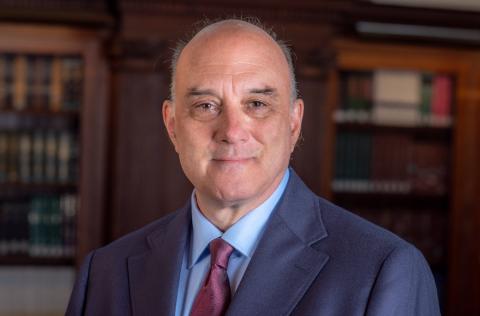
Robert W. Sobol, PhD, began his tenure as associate director for Basic Research and co-leader of the Cancer Biology Program at the Legorreta Cancer Center at Brown University on September 1, 2022. He leads efforts toward continued growth of the basic science program and will serve as the co-leader of the Cancer Biology Program. He is also a professor of pathology and laboratory medicine.
Prior to coming to Brown, Dr. Sobol was chief of the Molecular and Metabolic Oncology Program and the Point Clear Charities Professor of Oncologic Sciences at the Mitchell Cancer Institute at the University of South Alabama. His research focuses on DNA repair mechanisms, PARP and NAD+ metabolism, and the convergent role of these enzymes and pathways in response to environmental genotoxins and chemotherapy.
“Dr. Sobol’s world-renowned expertise in DNA repair and cellular aging is a superb addition to the Legorreta Cancer Center and our scientific community in Rhode Island,” said Wafik El-Deiry, MD, PhD, FACP, associate dean for oncologic sciences and director of the Legorreta Cancer Center. “It complements our existing research on industrial pollutants and genotoxicity.”
At the Legorreta Cancer Center, Dr. Sobol will focus on the role of the DNA base excision repair pathway in the regulation of PARP (an enzyme that helps damaged cells repair themselves) activation and the response to replication stress, and the identification of novel targets to overcome PARP-inhibitor resistance. He is also working on the development of novel biological tools and assays to evaluate PARP-activation, genotoxic stress, and gene-environment interactions and the utilization of these novel tools for the analysis of tumor response, the response to industrial pollutants, and the discovery of molecules that inhibit cellular repair.
“These areas of focus are even more important here in Rhode Island where we have higher rates of several cancers such as bladder, prostate, lung, breast, endometrial, brain, and bile duct cancer, among others. There is a huge need here to look into industrial or other environmental pollutants and exposures and their links to cancer susceptibility among different racial and ethnic groups,” El-Deiry says.
Dr. Sobol’s lab has a translational focus on how these PARP-dependent DNA Damage Response pathways impact tumor cell survival, genotoxicity, cellular aging and response to chemo- and immune-checkpoint based therapies. Benedito Carneiro, MD, MS, associate professor of medicine, co-leader of the Cancer Therapeutics Program at the Legorreta Cancer Center, and leader of early phase clinical trials at the Lifespan Health System says, “PARP inhibitors are now approved for cancer treatment including in patients with mutated BRCA1 and BRCA2 genes that occur in breast, ovarian, pancreatic, and prostate cancer. We are looking forward to collaborating with Dr. Sobol in our cancer clinical trials programs to translate his innovative basic science insights into trials that offer hope to patients.”
“Dr. Sobol’s appointments in the Legorreta Cancer Center and the Department of Pathology and Laboratory Medicine bring a new, critical facet to our work in the area of cancer biology,” said Jonathan Kurtis, MD, PhD, Stanley Aronson Professor of Pathology and chair of the department. He added, “We can feel the energy and momentum as we bring world-class investigators like Dr. Sobol to our Brown community and look forward to seeing the collaboration, growth and impact in the field of cancer research in the coming years.”